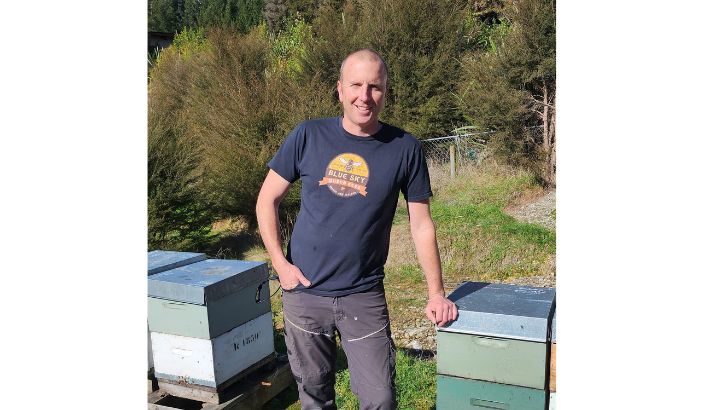Proof NZ mānuka is different

Wakefield-based beekeeper and advocate for the bee sector, Nick Milne, says research confirms the accepted view in New Zealand that the mānuka plant, and its by-products including honey, are unique to New Zealand. Photo: Supplied.
A recent study comparing the DNA of mānuka from New Zealand and Leptospermum scoparium, also known as jelly bush or tea tree, from Australia showed significant genetic differences between the two, enough for the researchers to recommend that the two plants should be called different species.
The recent study, undertaken by Plant and Food Research, analysed 2,000 variable DNA markers called ‘SNiPs’ (single DNA letter changes) in the DNA of each plant from both New Zealand and Tasmania.
“This research confirms the accepted view in New Zealand that the mānuka plant, and its by-products including honey, are unique to New Zealand,” says Wakefield-based beekeeper and apiculture advocate, Nick Milne.
“Increased recognition of this would be a great help to Nelson and Tasman beekeepers, as well as beekeepers nationwide.”
Nick has been beekeeping for over 25 years, following in the footsteps of both his father and grandfather who were also beekeepers.
“The mānuka honey price has collapsed over the last few years due in part to honey coming out of Australia that does not need to conform to the New Zealand testing and labelling regime but competes in the same markets as us, creating a very challenging space,” he says.
Mānuka Charitable Trust chair Pita Tipene says the research provides further evidence that mānuka is a recognised taonga (treasure) under the Treaty of Waitangi.
“Mānuka is a Māori word and tree that belongs to us. The expropriation of the name ‘mānuka honey’ to a plant or natural product from outside Aotearoa New Zealand is taking the identity and associated epistemology of our culture – our knowledge and what we know and believe. It belongs to us, and it is being taken and used in a way that’s misleading. What’s more, it’s ignoring the original names developed over thousands of years of history of the Aboriginal peoples of Australia,” Pita says.
The researchers state that the results support mānuka as a single endemic New Zealand species with marked geographic provenances that have significant gene flow and variation, largely due to environmental conditions. The researchers note the results have significant cultural and commercial implications, especially for products derived from each species, including honey.
“Genetic testing of mānuka previously had shown that there was a difference between those trees in New Zealand and those in Australia, so we wanted to understand more about the extent of these differences,” says Dr David Chagné, a Plant and Food Research scientist involved in the study.
The study shows that there is a strong genetic differentiation between NZ mānuka and Australia’s, to the point some researchers suggest the two plants should be genetically classified as different species.
“Origin matters because people buy ‘mānuka honey’ as they see the value in origin and terroir, particularly when it comes to natural products,” says Rob Chemaly, chair of the Unique Mānuka Factor Honey Association.
“Evidence supports the distinct health benefits of honey that comes from New Zealand’s mānuka tree – not products derived from other origins.”
